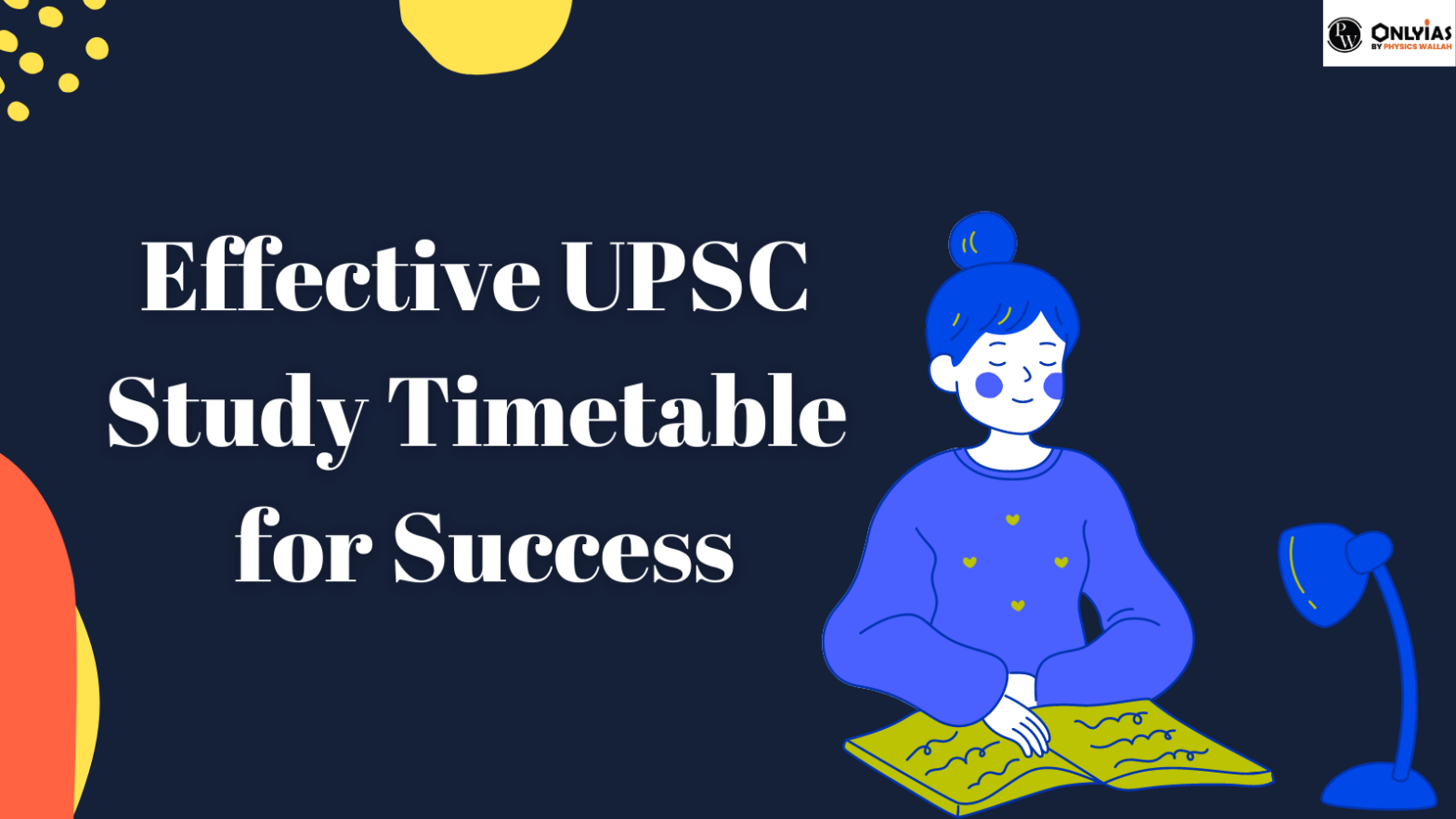![]() Madhavi Gaur
Madhavi Gaur
![]() August 21, 2023 02:24
August 21, 2023 02:24
![]() 19082
19082
![]() 0
0

UPSC Study Timetable: Preparing for the UPSC exam is a challenging journey that requires meticulous planning and disciplined execution. One of the key components of successful UPSC exam preparation is a well-structured study timetable. A study timetable not only helps you manage your time efficiently but also ensures that you cover all the necessary subjects and topics, allowing you to approach the exam with confidence. In this article, we will guide you through the process of creating an effective UPSC study timetable that can significantly enhance your chances of success.
UPSC Study Timetable: A study timetable acts as a roadmap for your preparation journey. It provides you with a clear plan of what to study, when to study, and how to manage your time effectively. With the vast syllabus of the UPSC exam, having a structured timetable ensures that you allocate sufficient time to each subject, preventing the last-minute rush and cramming. It also helps you maintain a balanced approach, allowing you to cover both static and dynamic portions of the syllabus, including current affairs and revision.
Two fundamental factors emphasize the necessity of a study schedule for your IAS exam preparation:
Creating a timetable is crucial when aiming to achieve a goal with dedication. For those aspiring to join the Civil Services, a UPSC Time Table becomes an essential tool. This structured schedule aids aspirants in effectively preparing for the IAS Exam by ensuring proper time management for both daily routines and upcoming exams.
Guiding Direction: Amidst the overwhelming array of UPSC study materials, a timetable provides a clear path forward, giving you a sense of direction when navigating through the resources.
Comprehensive Syllabus Coverage: Crafting a well-structured study timetable ensures that you cover the extensive UPSC syllabus within the allotted timeframe. With a pre-planned schedule, you can allocate sufficient time to each subject, preventing last-minute cramming and reducing exam-related stress.
Stress Reduction: A meticulously organized schedule helps in stress management. By knowing what to study when, you can avoid unnecessary stress and perform optimally. Preparedness translates to better performance on the actual exam day.
Customized Approach: Developing a personalized UPSC study time table enables you to tailor your approach to each subject based on your strengths and weaknesses. This approach fosters a deeper understanding and retention of information.
Enhanced Retention: A structured study timetable aids memory retention as it eliminates randomness. Focused, targeted studying improves concentration, leading to better absorption of knowledge.
Heightened Productivity: Adhering to a planned study routine enhances productivity by reducing confusion and optimizing learning efficiency. A streamlined approach prevents wastage of time and energy.
Time Management: A set study schedule provides a clear delineation between study time and breaks, enabling effective time management. By adhering to your timetable, you maximize available hours and enhance productivity.
Assessment Facilitation: A study timetable encourages regular self-assessment. Periodic evaluations help gauge your progress and identify areas needing more attention, aiding in continuous improvement.
Honesty: Candid self-assessment is paramount. Facing the demanding journey of IAS preparation requires honesty about your commitment and dedication to the process. Sincerity is the bedrock upon which your study plan should be built.
Seriousness: The pursuit of your IAS dream demands unwavering seriousness and commitment. This journey is not a frivolous endeavor; treating it as such would be a disservice to your aspirations.
Discipline: Crafting a study timetable is futile without the discipline to adhere to it. Just as the military’s efficiency thrives on discipline, your success in the UPSC exam hinges on your ability to cultivate and maintain a disciplined approach.
Perseverance: Your study timetable should be a testament to your unyielding perseverance. Uphold your determination to follow the schedule steadfastly, even when faced with challenges.
Goal-Setting: Integrate concrete short and long-term goals into your IAS study timetable. Clear objectives provide direction and serve as motivational checkpoints on your journey towards success.
Enjoyment: Embrace the process of learning and growth. Similar to the sentiment echoed by Thomas Edison, find enjoyment in the process. Transform the pursuit of knowledge into an enjoyable endeavor rather than a mere chore.
Concentration: Concentration is the linchpin of achievement. While a well-crafted plan is essential, unwavering focus on the task at hand is equally crucial for success.
Health Maintenance: Upholding good physical and mental health is foundational to your journey. A healthy body and mind provide the energy and clarity necessary to execute your study plan effectively.
Presented below is an illustration of a study timetable embraced by top-performing candidates. This model strikes a balance between realism and inclusiveness, incorporating all essential elements. It’s important to note that while this serves as a prototype, its adaptability is key – tailoring it to align with individual preferences is encouraged.
| Time | Activity |
|---|---|
| 6:00 AM – 7:30 AM | Morning Routine, Exercise, and Breakfast |
| 7:30 AM – 9:00 AM | Current Affairs and Newspaper Reading |
| 9:00 AM – 11:00 AM | Study Session – Subject 1 |
| 11:00 AM – 11:15 AM | Short Break |
| 11:15 AM – 1:00 PM | Study Session – Subject 2 |
| 1:00 PM – 2:00 PM | Lunch Break |
| 2:00 PM – 4:00 PM | Study Session – Subject 3 |
| 4:00 PM – 4:15 PM | Short Break |
| 4:15 PM – 6:00 PM | Practice Answer Writing |
| 6:00 PM – 7:00 PM | Leisure Time/Hobbies |
| 7:00 PM – 8:00 PM | Revision of the Day’s Topics |
| 8:00 PM – 9:00 PM | Dinner |
| 9:00 PM – 9:30 PM | Mindfulness and Relaxation |
| 9:30 PM – 10:30 PM | Revision of the Day’s Topics |
| 10:30 PM – 11:00 PM | Bedtime Routine and Wind Down |

Remember, this is just a sample timetable. You can customize it according to your preferences, daily routines, and the subjects you need to cover. The key is to maintain a balance between study sessions, breaks, revision, and leisure activities to ensure an effective and sustainable study routine.
Creating a well-structured study timetable is an essential step towards UPSC exam success. It empowers you to manage your time effectively, maintain a balanced approach to subjects, and stay organized throughout your preparation journey. Remember, a study timetable is a tool that works best when combined with dedication, hard work, and a positive attitude. With a comprehensive and realistic study plan in place, you’ll be well on your way to conquering the challenges of the UPSC exam and achieving your desired results.
<div class="new-fform">
</div>

Latest Comments